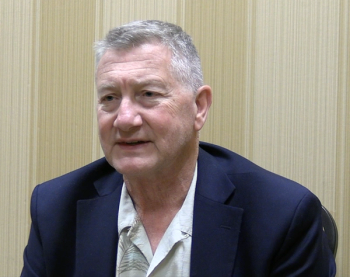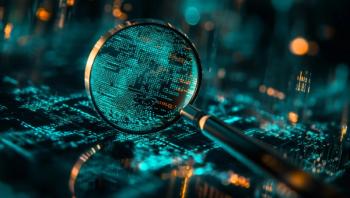
- Special Issues-05-02-2005
- Volume 0
- Issue 0
53rd Annual ASMS Conference Gets an Upgrade
The annual event will continue its tradition of promoting knowledge of all things mass spectrometry, with a few new features mixed in.
The 53rd American Society for Mass Spectrometry (ASMS) Conference on Mass Spectrometry and Allied Topics will take place June 5–9 at the Henry B. Gonzalez Convention Center in San Antonio, TX. As has been the tradition, this year's event will be geared toward promoting and disseminating knowledge of MS and its allied topics, with the overall goal of providing new knowledge that will help further the advancement of techniques and instrumentation in MS, as well as fundamental research in chemistry, geology, the biological sciences, and physics.
The 2005 conference will hold true to its predecessors' standards, but with a few new features mixed in. Aside from an increase in attendance compared to last year's event in Nashville, TN (an expected 6000 attendees compared with 2004's 5200 figure), this year's show will offer Web casting of the conference's oral sessions for the very first time.
"You have to be registered with the conference to have access to the web casts, and they'll be delayed by one day," explains Judith A. Sjoberg, executive director of ASMS. "Each registrant will be limited to being able to see each presentation only one time, and they will only be available for one week after the conference. What we're attempting to do is to make the conference a little more manageable for attendees this year because with six concurrent sessions, often people can't see everything they'd like to."
Short Courses
ASMS 2005 will feature the same short courses included in last year's conference as well as an 11th course making its first appearance. Here is an overview of this year's courses:
FT-MS: Principles and Applications. This course is intended for individuals who have no prior knowledge of Fourier-transform-mass spectrometry (FT-MS). It also should prove to be useful for those who have moderate experience with FT-MS but would like to develop a better understanding of its underlying fundamental principles.
Interpretation of Mass Spectra. An introductory level course on the qualitative interpretation of mass spectra of organic, biological, and biochemical compounds. The course will be taught through the use of practical examples and is targeted at those individuals with knowledge of organic chemistry and organic structures.
LC–MS: The Techniques of Electrospray and APCI. One of the longest running courses at ASMS, it is designed for chromatographers or mass spectrometrists who want to be successful in solving problems by liquid chromatography (LC)–MS. The course will cover the atmospheric pressure ionization (API) techniques of electrospray ionization (ESI), pneumatically assisted electrospray, and atmospheric pressure chemical ionization (APCI) using single-quadrupole, triple-quadrupole, and ion-trap mass analyzers.
LC–MS Technology: Fundamentals and Applications of High Resolution/Accurate Mass in Pharmaceutical Analysis. Being offered for the first time at this year's event, this course is designed to introduce participants to the utility, advantages, and limitations of conducting LC–MSnanalyses using high-resolution MS. The fundamental concept of high resolution will be developed, as will techniques for accurate mass measurement and mass calibration.
MALDI-TOF MS: Fundamentals and Applications. This course discusses the basic instrumentation and theory of matrix-assisted laser desorption ionization time-of-flight (MALDI-TOF) MS. An overview of current instrumentation and practices will be presented, including a discussion of the relative advantages of linear and reflectron instruments.
Drug Discovery Using Mass Spectrometry: From Target Identification to IND Enabling Studies. This course will focus on providing a firm understanding of the drug discovery process, from initial target identification through investigational new drug (IND) enabling studies. It also will teach attendees how to learn from and apply the numerous types of MS studies carried out to support these drug discovery efforts.
MS-MS: Fundamentals and Applications. This course is targeted at new users of MS-MS who have basic knowledge of MS. Participants also should be familiar with modern ionization methods, such as ESI and MALDI, and understand the basic principles of mass analysis with different mass analyzers.
LC–MS: Practical Aspects. Commercially available and new approaches to accomplishing online LC–MS analyses will be covered. The course will provide introductions to HPLC and MS and themes common to all LC–MS interfaces, with an emphasis on those phenomena that are important to successful LC–MS experiments.
Proteins and Peptides. Characterization by LC–MS–MS-MS. A fairly new, advanced-level course, this is targeted at scientists who want to learn specific techniques for the MS and MS-MS characterization of peptides and proteins, including proteomics. Fundamental aspects of protein chemistry, sample preparation, MS (hardware and software), and sample introduction systems (nanospray, capillary LC, LC-LC, and CE) will all be discussed.
Quadrupole Ion-Trap Mass Spectrometry and Tandem Mass Spectrometry. This course will present the ion physics, ion chemistry, and aspects of instrumentation necessary for a basic understanding of modern quadrupole ion-trap MS and quadrupole ion-trap tandem MS.
Quantitative Mass Spectrometry. An introductory–intermediate level course, it will explore the principles of quantitative MS. A general discussion of principles will take place and will be reinforced through exemplary papers in the field.
Lectures
The show's initial plenary lecture will be presented by Firouz Naderi of Jet Propulsion Laboratory, and is titled, "Six Intense Minutes, a Hole in One and a Salty Sea — the Landing of NASA's Mars Exploration Rovers."
"This lecture was something that the program chair felt was interesting," Sjoberg says. "The plenary lecture doesn't necessarily follow a hot trend — it might be about what's current in the news."
In sticking to discussing current events, on Thursday, June 9, Don Catlin of the UCLA Olympics Laboratory is scheduled to offer his plenary lecture, titled, "Drugs, Sports and Mass Spectrometry," which will discuss testing for performance-enhancing drugs in athletics.
Awards
The presentation of the conference's annual awards once again will help honor the past, present, and future of MS.
The Award for a Distinguished Contribution to Mass Spectrometry recognizes a focused, singular achievement in, or contribution to, fundamental or applied MS. The honoree is being recognized for having made a contribution that has had a significant impact on the fundamental understanding and practice of MS.
Professor James A. McCloskey of the University of Utah (Salt Lake City, UT) will be presented with this year's honor for his fundamental contributions to the analysis of nucleic acids. Since the late 1960s, McCloskey has contributed over 200 publications on nucleic acids and modified RNA, including 1982–1983 papers in Science that discussed the significance of his early nucleoside work.
The Biemann Medal, presented in honor of Professor Klaus Biemann, recognizes a significant achievement in basic or applied MS made by an individual early in their career. This year's winner is Gary J. Van Berkel of Oak Ridge National Laboratory (Oak Ridge, TN) for his achievements and contributions to an understanding of the detailed elucidation of the electrochemical aspects of electrospray ionization.
Articles in this issue
almost 21 years ago
Acronyms in Mass Spectrometryalmost 21 years ago
Mass Spectrometry in the Analytical Sciences Digital Libraryalmost 21 years ago
Using FT-MS to Detect Indoor Chemical Contaminationalmost 21 years ago
GC–MS Analysis on Titan Missionalmost 21 years ago
Time-of-Flight Mass Spectrometry for Proteomics Researchalmost 21 years ago
A Mathematical Approach to Error Reduction in Mass Spectrometryalmost 21 years ago
On-line and Off-line 2-D LC–ESI MS-MS Methods in Proteomic AnalysisNewsletter
Get essential updates on the latest spectroscopy technologies, regulatory standards, and best practices—subscribe today to Spectroscopy.



